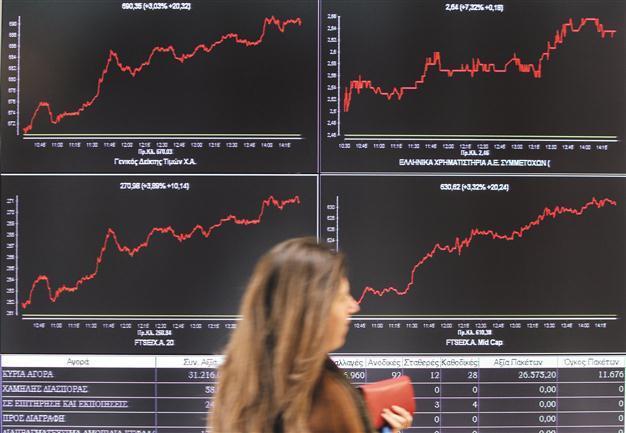Creditors leave Athens, talks continue on phone
LONDON/ATHENS - Reuters

An employee of Athens bourse passes in front of a chart in Athens on Jan. 19. Markets were subdued last week as investors awaited results of talks in Greece’s debt-reduction. However, private creditors failed to achive results in talks, one source says. AP photo
Chief negotiators for Greece’s private
creditors left Athens on Jan. 21 without a deal on a
debt swap plan that is vital to avert a chaotic default, sources close to the negotiations told Reuters.
A technical team stayed in the Greek capital to work on details, and negotiations will continue over the phone, but it was unlikely a deal can be clinched before a crucial meeting of
eurozone finance ministers today, the sources said.
Greek officials had been expecting Institute of International Finance chief Charles Dallara, who negotiates in the name of creditors, to hold meetings on Saturday but he left early in the day for Paris.
The IIF denied that Dallara and his adviser Jean Lemierre had left unexpectedly and said they had longstanding personal appointments. Following several rounds of talks from Wednesday to Friday last week, Greece and its private creditors are converging towards a deal in which private creditors will take a real loss of 65 to 70 percent, sources close to the negotiations said.
‘Things are complicated’But a lot of details are still unresolved, including on legal aspects of the deal, the sources said.
“Discussions will continue over the phone this weekend but an agreement is unlikely before next week, if there is an agreement at all,” one source close to the talks said. “Things are complicated, we are getting closer on the numbers but there is still quite some work ahead.”
Much of the attention will now turn to the euro zone finance ministers’ meeting in Brussels, and to how
EU paymaster Germany and the IMF view the progress in the debt swap talks.
The IMF and EU countries, and in particular the bloc’s paymaster Germany, want to make sure the deal puts Greece’s derailed finances back on a sustainable track before they agree to a new, 130 billion-euro bailout, which is also crucial to avoid a messy default. How much money Athens needs from official lenders also depends on the details of the debt swap deal.
The IMF insists any deal must ensure Greece’s debt burden will be cut to 120 percent of GDP by 2020 from 160 percent now, as agreed at an EU summit in October, and has warned that this is made more difficult by the fact that Athens’ economic prospects have deteriorated since.
The IIF repeated on Jan. 25 that progress was made and the talks were continuing. “They (Dallara and Lemierre) are both fully available to the Greek government’s leadership by telephone should this be necessary,” the IIF said in a statement.
crisis, economics,
